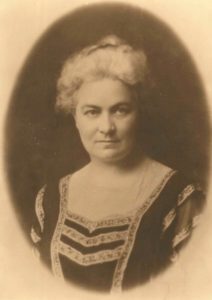She was born in 1865 into a prominent Grand Rapids family. But Cornelia Steketee's life was anything but typical. She was a teacher, an author, a social advocate, and, on occasion, a politician. Steketee's father, John, was a successful businessman—although not a member of the Steketee family who opened the Department Store bearing that name. John held a number of influential positions in the city including revenue collector for the Fourth District of Michigan and Vice-Consul to the Netherlands.
Cornelia could have had it easy but chose her own path. She attended the University of Michigan where she met her future husband, physician, and Michigan alum Henry Hulst. The couple moved to Grand Rapids with Cornelia taking a job as an English teacher at Central High School. Although her career at Central spanned 30 years, Steketee Hulst was as busy outside the classroom as she was in it. In 1903, she joined a small group of women who elected to run for the city's Library Commission. The commission, like many institutions in the city, was run strictly by men. Although none of the women were elected, Steketee Hulst received the highest vote total among them.
While she didn't run again for public office she became active in numerous education advocacy groups. She was elected vice president of the National Education Association (NEA) in 1912 in a vote that led a number of the NEA's eastern members—who dominated the group up to that point—to threaten to leave and start their own chapter. The issue apparently cooled after that as Steketee Hulst was elected President of the Association a year later, the first woman to hold the post. Steketee Hulst also managed a successful career as a writer, authoring books on subjects as varied as mythology, indigenous people, monetary policy, and roentgenography—medical imaging technology of which her husband was a recognized pioneer. While her books sold well, one of them got more attention than she'd anticipated.
Her book "Our Secret Alliance," based on a paper she'd written in 1916 theorized that Britain's foray into World War I could be viewed as an extension of imperialist policy and that the U.S. may have entered into a secret alliance with the British. The U.S. entered the war a year later and the government was not amused. The book was condemned and subsequently banned. When the news reached Grand Rapids, Steketee Hulst was deemed unpatriotic, and calls for her resignation echoed citywide. Steketee Hulst took a voluntary leave of absence but it was to no avail. Her contract was not renewed by the Board of Education.
In addition, a proposal to require a loyalty oath from every teacher signing a contract was presented to the Board by the Sons of the American Revolution. Hardly admonished, Steketee Hulst took the opportunity to defend herself, reaffirming her patriotism and suggesting suspicions alone were shallow grounds for dismissal. She became active in a massive registration of women for war work and made herself highly visible in her support for the U.S. effort. When the war ended she began a well-advertised and highly popular lecture tour on ancient myths.
Steketee Hulst continued to write throughout the remainder of her long life. She lived to the age of 92 and some 65 years after her death her books are still available in print, including "Our Secret Alliance."

Sources: Greater Grand Rapids Women's History Council; The Grand Rapids Press, March 26, 1918; The Grand Rapids Press, March 21, 1918; The Grand Rapids Press, April 2, 1918.
Image: Courtesy of Grand Rapids History Center






